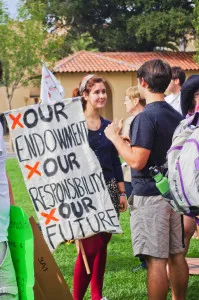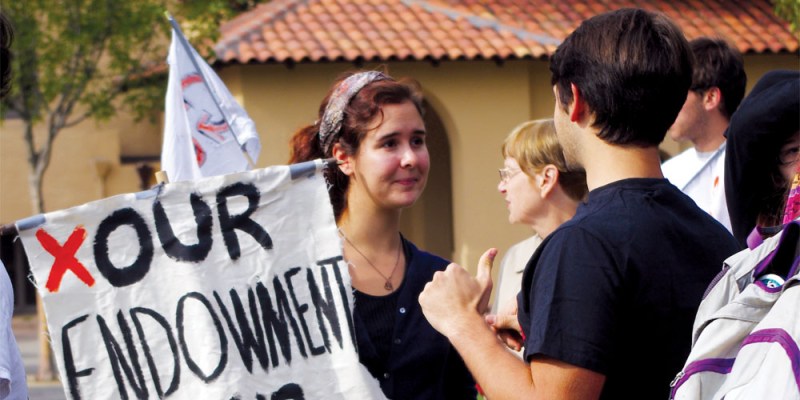
The Stanford University Board of Trustees announced yesterday that the University will no longer directly invest endowment funds in coal mining companies, making Stanford the first major American university to take such a step.
The Board’s decision reflects an endorsement of the Advisory Panel on Investment Responsibility and Licensing (APIRL)’s position that divesting from coal extraction companies is consistent with the obligations outlined in Stanford’s Statement on Investment Responsibility.
While that statement identifies the primary obligation of the trustees in managing the endowment as maximizing financial returns, it also states that—if trustees judge that ”corporate policies or practices create substantial social injury”—they can weigh that factor in making investment decisions.
“Stanford has a responsibility as a global citizen to promote sustainability for our planet,” said President John Hennessy in a statement accompanying the announcement. “The university’s review has concluded that coal is one of the most carbon-intensive methods of energy generation and that other sources can be readily substituted for it. Moving away from coal in the investment context is a small, but constructive, step while work continues, at Stanford and elsewhere, to develop broadly viable sustainable energy solutions for the future.”
As of August 2013, Stanford’s investment has a value of approximately $18.7 billion. While Stanford does not disclose specific investments or their value, the resolution stipulates that the University stop directly investing in approximately 100 publicly traded companies that focus on coal extraction and that it divest of any current holdings in those firms.
In addition to divesting any direct investments, Stanford is also recommending that its external investment managers, who invest in wide ranges of securities on behalf of the University, avoid investments in coal mining companies.
According to University spokesperson Lisa Lapin, Stanford will begin the divestment process immediately.
Fossil Free Stanford
The decision to divest follows an organized campaign by the student group Fossil Free Stanford. Last year, the group petitioned the University to divest from over 200 fossil-fuel extraction companies and it has worked with the APIRL since to make the case that investing in fossil fuel companies is socially irresponsible.
According to Board Chair Steven Denning MBA ’78, Fossil Free Stanford “catalyzed an important discussion” about the University’s investments.
“We believe this action provides leadership on a critical matter facing our world and is an appropriate application of the University’s investment responsibility policy,” Denning told the Stanford News Service.
According to Lapin, the APIRL made the recommendation to divest from coal mining companies last month. The Board of Trustees’ vote was conducted by telephone yesterday.
Members of Fossil Free Stanford said that they hadn’t expected the Board to make a decision before its June meeting. However, University officials notified the group late last week that a decision was imminent and administrators personally notified the group members of the decision just prior to the public announcement yesterday afternoon.
Building a coalition
Earlier this year, the student body passed a resolution sponsored by Fossil Free Stanford supporting divestment from fossil fuels, with the measure garnering 78 percent of votes in favor.
“The referendum was generally symbolic but it showed that students were united about something in a way that they don’t usually get united,” said Michael Penuelas ’15, a student organizer of Fossil Free Stanford. “It was really powerful because it took student voices and magnified them to the institutional level.”
The same week the resolution passed, Fossil Free Stanford delivered over 200 letters from alumni to Hennessy’s office.
Yari Greaney ’15, another student organizer of Fossil Free Stanford, emphasized the group’s efforts to create a coalition of students, faculty and alumni against investment in fossil fuels.
“We really appreciate that Stanford does have these channels open to us,” Greaney said. “We can communicate our concerns to the advisory panel and we can move our concerns along to the Board of Trustees. We’re glad that that’s an opportunity that’s open to us and we are happy to take advantage of that.”
A major step
While the student body’s support for a resolution backing divestment from fossil fuels followed the example of student bodies at several peer institutions, the University’s decision to officially divest made Stanford the first major American university to do so.
In the past week, meanwhile, students at Harvard and Washington University in Saint Louis were arrested for protesting in favor of divestment. Administrators at other schools such as Yale and Brown have also thus far rejected divestment, even after their student bodies passed referendums in support of the action.
Members of Fossil Free Stanford expressed hope that Stanford’s decision will stimulate broader action. Greaney said her group doesn’t just see this as a first step in the divestment process but as a major step in the climate movement.
“We want to really celebrate this and put it in a bigger context than just a divestment campaign, because divestment is a strategy and fighting climate change is what we are working toward,” Greaney said.
Greaney added that Fossil Fuel Stanford’s central goal remains divestment from all fossil fuels.
“The entire fossil fuel industry is predicated on a business model that is incompatible with the climate and we will continue to ask that our administrators don’t fund an industry that pollutes our world,” Greaney said. “The Board seems open to further divestment so we’re excited to use this as a really strong and very powerful starting place.”
Contact Jana Persky at jpersky ‘at’ stanford ‘dot’ edu.
